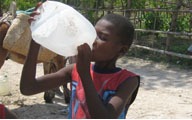
Supporting Recovery Efforts Through Increased Food Security
The devastating earthquake that hit Haiti on January 12, 2010, was centered about 10 miles west of Port-au-Prince; roughly half of the Southeast Department of Haiti is in the same impact radius as the capital. Already a food-insecure area, communities in the Southeast Department faced damage to infrastructure and property and farmers have less money to purchase essentials such as food, fuel, seeds and other agricultural inputs. Over 500,000 people fled the Port-au-Prince area to live with relatives in rural areas, including the Southeast Department.
This influx of internally displaced persons (IDPs) increased pressure on already-limited local food supplies, housing, water and sanitation facilities, and medical services. In the Southeast Department, health facilities were damaged, thousands of homes and businesses were destroyed, and many communities lost access to clean drinking water as the earthquake shifted the local aquifer. Even in areas that did not suffer direct damage, people struggled with high prices and fuel shortages.
In April of 2010, the Office of Foreign Disaster Assistance (OFDA) awarded ACDI/VOCA funding to work with earthquake-affected populations in Haiti to help them improve their food security, health and livelihoods. ACDI/VOCA’s program, Haitian Opportunities Post-Earthquake (HOPE), addressed the short- and medium-term needs of ACDI/VOCA’s area of operation in the Southeast Department. ACDI/VOCA designed the program and prioritized interventions based on the findings of rapid needs assessments and discussions with key government officials, donors and other local stakeholders. ACDI/VOCA drew upon its two years of operational experience implementing agricultural production, health, nutrition, water and sanitation interventions in the Southeast Department and the feedback of our national technical staff and local partner, Bureau de Nutrition et Developpment (BND).
ACDI/VOCA implemented activities in four main sectors:
Agriculture and Food Security
The project expanded the USAID Title II-funded Seed Multiplication Program, provided tools and other inputs to affected farmers and IDPs, and sensitized targeted household members with existing USAID Title II-funded training materials on the nutritional value of fruit and vegetable consumption.
Economic Recovery and Market Systems
The project used cash-for-work (CFW) to promote and restore livelihoods, strengthen community agricultural systems and increase the level of disaster preparedness.
Health
The project identified training needs in health facilities in the Southeast Department and provided appropriate refresher trainings on treatment, diagnosis and screening to health workers and Ministry of Health staff in affected areas.
Water, Sanitation and Hygiene (WASH)
ACDI/VOCA and its partners addressed the diminished access to clean water and proper sanitation facilities due to the effects of the earthquake in the Southeast Department. This included the Côtes-de-Fer camp of displaced persons, as well as areas that sustained more damage from the earthquake and communities with high numbers of IDPs. ACDI/VOCA and its partners provided latrines and conducted hygiene promotion activities in Côtes-de-Fer and repaired fresh water springs damaged by the earthquake in Côtes-de-Fer, Bainet and La Vallée. In addition, ACDI/VOCA distributed jerry cans and cups to people accessing the repaired springs and educated them on proper storage of drinking water to decrease the rate of diarrhea caused by contaminated water.
Sustainability
ACDI/VOCA worked closely with the Ministry of Agriculture and established farming associations to contribute to the overall agricultural strategy for the Southeast Department and ensure that ACDI/VOCA’s emergency response and livelihood recovery activities continue to support this strategy. Seed multiplication sites continued to supply the department with improved seeds after the project ended. ACDI/VOCA promoted diversification of crops and establishment of home gardens, while ensuring that beneficiaries understood the nutritional basis of the crops and gardens and used them for their own food security needs then and in the future.
Temporary employment projects were phased out slowly to allow beneficiaries to find new sources of income once the program ended. The completed CFW projects were designed to improve agricultural production through better soil management and irrigation, rehabilitation of secondary roads, and disaster preparedness against hurricane damage, all of which had a lasting impact on the recipient communities.


